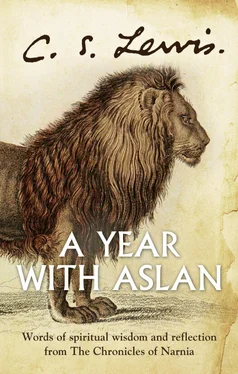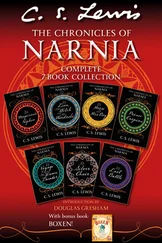– The Silver Chair
What about the Lady puts Puddleglum on his guard? Similarly, what about her leads Jill and Eustace to trust her?
M ARCH16
Puddleglum and the Children Disagree
THE CHILDREN THANKED HER AGAIN, with shining eyes, and the Lady waved to them. The Marsh-wiggle took off his steeple-hat and bowed very stiffly. Then the silent Knight and the Lady started walking their horses up the slope of the bridge with a great clatter of hoofs.
“Well!” said Puddleglum. “I’d give a good deal to know where she’s coming from and where she’s going. Not the sort you expect to meet in the wilds of Giantland, is she? Up to no good, I’ll be bound.”
“Oh rot!” said Scrubb. “I thought she was simply super. And think of hot meals and warm rooms. I do hope Harfang isn’t a long way off.”
“Same here,” said Jill. “And hadn’t she a scrumptious dress? And the horse!”
“All the same,” said Puddleglum, “I wish we knew a bit more about her.”
“I was going to ask her all about herself,” said Jill. “But how could I when you wouldn’t tell her anything about us?”
“Yes,” said Scrubb. “And why were you so stiff and unpleasant? Didn’t you like them? . . .”
“I was wondering,” remarked Puddleglum, “what you’d really see if you lifted up the visor of that helmet and looked inside. . . . How about a skeleton? . . . Or perhaps,” he added as an afterthought, “nothing at all. I mean, nothing you could see. Someone invisible.”…
“Oh, bother his ideas!” said Scrubb. “He’s always expecting the worst, and he’s always wrong. Let’s think about those Gentle Giants and get on to Harfang as quickly as we can. I wish I knew how far it is.”
– The Silver Chair
Why does Puddleglum urge caution? On what are Jill and Eustace basing their decision to travel to Harfang? How do our base needs get in the way of our judgement?
M ARCH17
The Road Grows Long
AFTER THAT TALK WITH THE LADY things got worse in two different ways. In the first place the country was much harder. The road led through endless, narrow valleys down which a cruel north wind was always blowing in their faces. There was nothing that could be used for firewood, and there were no nice little hollows to camp in, as there had been on the moor. And the ground was all stony, and made your feet sore by day and every bit of you sore by night.
In the second place, whatever the Lady had intended by telling them about Harfang, the actual effect on the children was a bad one. They could think about nothing but beds and baths and hot meals and how lovely it would be to get indoors. They never talked about Aslan, or even about the lost prince, now. And Jill gave up her habit of repeating the signs over to herself every night and morning. She said to herself, at first, that she was too tired, but she soon forgot all about it. And though you might have expected that the idea of having a good time at Harfang would have made them more cheerful, it really made them more sorry for themselves and more grumpy and snappy with each other and with Puddleglum.
– The Silver Chair
Why would looking forward to comforts make the children so grumpy? Have you ever noticed this effect on yourself?
M ARCH18
The Adventure Begins
[POLLY’S AND DIGORY’S] adventures began chiefly because it was one of the wettest and coldest summers there had been for years. That drove them to do indoor things: you might say, indoor exploration. It is wonderful how much exploring you can do with a stump of candle in a big house, or in a row of houses. Polly had discovered long ago that if you opened a certain little door in the box-room attic of her house you would find the cistern and a dark place behind it which you could get into by a little careful climbing. The dark place was like a long tunnel with brick wall on one side and sloping roof on the other. In the roof there were little chunks of light between the slates. There was no floor in this tunnel: you had to step from rafter to rafter, and between them there was only plaster. If you stepped on this you would find yourself falling through the ceiling of the room below. Polly had used the bit of the tunnel just beside the cistern as a smugglers’ cave. She had brought up bits of old packing cases and the seats of broken kitchen chairs, and things of that sort, and spread them across from rafter to rafter so as to make a bit of floor. Here she kept a cash-box containing various treasures, and a story she was writing and usually a few apples. She had often drunk a quiet bottle of ginger-beer in there: the old bottles made it look more like a smugglers’ cave.
– The Magician’s Nephew
Like many children, Polly and Digory use their imaginations to create exciting places out of just about nothing. Do you still have this ability? What value do imagination and a sense of exploration have in today’s world?
M ARCH19
The Stone Lion
EDMUND CREPT UP to the arch and looked inside into the courtyard, and there he saw a sight that nearly made his heart stop beating. Just inside the gate, with the moonlight shining on it, stood an enormous lion crouched as if it was ready to spring. And Edmund stood in the shadow of the arch, afraid to go on and afraid to go back, with his knees knocking together. He stood there so long that his teeth would have been chattering with cold even if they had not been chattering with fear. How long this really lasted I don’t know, but it seemed to Edmund to last for hours.
Then at last he began to wonder why the lion was standing so still – for it hadn’t moved one inch since he first set eyes on it. Edmund now ventured a little nearer, still keeping in the shadow of the arch as much as he could. He now saw from the way the lion was standing that it couldn’t have been looking at him at all. (“But supposing it turns its head?” thought Edmund.) In fact it was staring at something else – namely a little dwarf who stood with his back to it about four feet away. “Aha!” thought Edmund. “When it springs at the dwarf then will be my chance to escape.” But still the lion never moved, nor did the dwarf. And now at last Edmund remembered what the others had said about the White Witch turning people into stone. Perhaps this was only a stone lion. And as soon as he had thought of that he noticed that the lion’s back and the top of its head were covered with snow. Of course it must be only a statue! No living animal would have let itself get covered with snow. Then very slowly and with his heart beating as if it would burst, Edmund ventured to go up to the lion. Even now he hardly dared to touch it, but at last he put out his hand, very quickly, and did. It was cold stone. He had been frightened of a mere statue!
The relief which Edmund felt was so great that in spite of the cold he suddenly got warm all over right down to his toes, and at the same time there came into his head what seemed a perfectly lovely idea. “Probably,” he thought, “this is the great Lion Aslan that they were all talking about. She’s caught him already and turned him into stone. So that’s the end of all their fine ideas about him! Pooh! Who’s afraid of Aslan?”
And he stood there gloating over the stone lion, and presently he did something very silly and childish. He took a stump of lead pencil out of his pocket and scribbled a moustache on the lion’s upper lip and then a pair of spectacles on its eyes. Then he said, “Yah! Silly old Aslan! How do you like being a stone? You thought yourself mighty fine, didn’t you?” But in spite of the scribbles on it the face of the great stone beast still looked so terrible, and sad, and noble, staring up in the moonlight, that Edmund didn’t really get any fun out of jeering at it. He turned away and began to cross the courtyard.
Читать дальше












